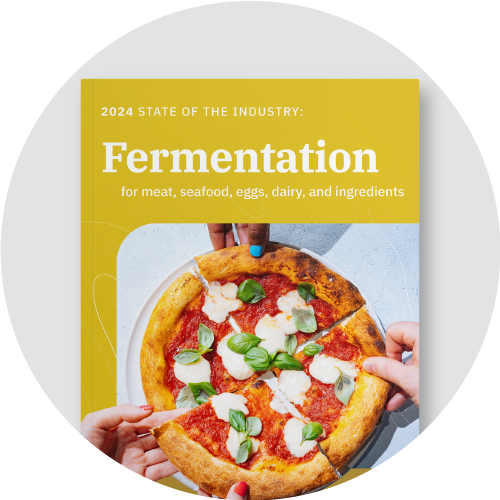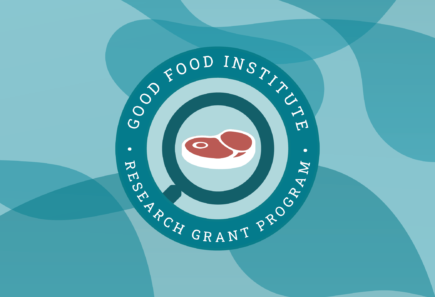
State of the Industry: Fermentation for meat, seafood, eggs, dairy, and ingredients
This report covers developments in the commercial landscape, product trends, investment data, and regulatory developments for fermentation-enabled meat, seafood, eggs, and dairy.

Explore new data and industry insights
Executive summary
In 2024, new fermentation-enabled products from whole-cut steaks to egg proteins hit supermarket shelves, helping to meet the growing demand for foods loved around the world, made in vastly more efficient ways.
The year included notable milestones across science, industry, and policy: the scientific ecosystem grew with new research centers and pilot facilities, mycoprotein continued to receive extensive R&D and commercialization interest, and significant regulatory approval milestones were seen in Canada and New Zealand.
The fermentation sector also faced challenges. Fermentation companies need access to more resources to expand product variety, increase scale, and implement process improvements. Looking ahead, fermentation companies must continue to pursue creative and multi-pronged funding strategies to access the capital needed for the industry to achieve scale.
Despite these challenges, the early chapters of fermentation’s story are defined by innovation, versatility, and promise. This report on fermentation details the major innovations and developments that moved the field of fermentation-enabled protein forward in 2024.
Report highlights
- Industry associations
- New facilities
- Strategic partnerships
- Product trends
- Private investment data and insights
- Research updates
- Public investment and regulation
- Industry outlook
Key developments
This report provides a comprehensive global analysis of the fermentation-enabled alternative protein industry, including the commercial landscape, investments, regulatory developments, and scientific progress. Highlights featured in the report include:
Commercial landscape
New industry facilities, diversified companies, and partnerships
- At least 17 fermentation facilities opened or were announced in 2024. Most of the activity occurred in the biomass and precision fermentation sectors, although at least one traditional fermentation facility opened and one was announced. At least five of those facilities were innovation hubs or research and development centers, which can help companies de-risk processes, demonstrate commercial viability, and reduce scale-up costs.
- New activity in the fermentation sector from diversified companies accelerated in 2024. Diversified companies established partnerships, invested in companies and facilities, and debuted new fermentation-enabled products.
- At least 21 partnerships were formed in the fermentation sector in 2024, with especially robust activity in dairy product development and commercialization, seafood product development, and process optimization. Dairy end-product manufacturers, in particular, recognize fermentation’s unique ability to efficiently produce functional ingredients, as several large conventional dairy companies partnered with fermentation companies in 2024.
Investments
All-time investment reaches a new high
- The four largest fermentation deals in 2024 were Meati’s $100 million Series C, Perfect Day’s $90 million Series E, Formo’s $61 million Series B, and Infinite Roots’ $58 million Series B.
- Of the top four fermentation deals in 2024, only Meati ranks among the all-time top 10 largest private investments in the fermentation sector. The investment environment of the past two years has been fundamentally different from the low-interest-rate period of 2019 to 2022, when the other nine largest fermentation rounds were raised.
- Since the first disclosed investment in a fermentation company in 2013, privately held companies in the fermentation sector have raised $4.8 billion, while publicly traded companies have secured $39 million.
Science and technology
New research centers, pilot capabilities, and titer advancements
- Three new Centers of Excellence in Alternative Protein, funded by the Bezos Earth Fund, were founded at Imperial College London, the National University of Singapore, and North Carolina State University. Meanwhile, NAPIC and SUSFERM launched fermentation-focused research centers.
- From Australia’s FaBA to the US’ iFAB in the U.S., new facilities were planned, while MISTA commissioned a high- and low-moisture extruder for piloting end products.
- Every Company reported ovalbumin titers from 17-30 g/L in K. phaffii, and Onego Bio reported 120 g/L in Trichoderma reesei, representing significant strides over previously published titers in S. cerevisiae , K. phaffii, and T. reesei.
Government and regulation
Public funding and support
- Canada approved fermentation-derived animal-free milk for the first time in January 2024, when Health Canada issued a “Letter of No Objection” indicating that it does not have food safety concerns about the use and sale of Remilk’s animal-free milk protein.
- In August 2024, the Indian Union Cabinet approved the BioE3 policy (Biotechnology for Economy, Environment, and Employment Policy for Fostering High-Performance Biomanufacturing) with smart protein (alternative proteins, including fermentation-derived proteins) as one of six key thematic sectors.
- In May 2024, New Zealand’s Daisy Lab, a precision fermentation biotech company, received approval from the New Zealand Environmental Protection Authority (EPA) for its application to expand its dairy protein production platform to 5,000 liters. This regulatory approval will enable the construction of a pilot facility, marking a significant step forward in scaling and marketing this technology in New Zealand, the largest global dairy exporter.
- In 2024, the United States government funded nearly 25 research projects or business grants advancing fermentation technology for defense, economic development, agricultural benefits, or nutrition enhancement, including a $51 million investment in precision fermentation capacity in Illinois.

Download our at-a-glance summary
Don’t have time to read the full report? Check out our summary for a quick view of the highlights and key data points from this report.
Hear from our experts
This webinar covers the commercial landscape, investments, science and technology progress, regulation and public funding, and industry forecasts for the fermentation-enabled alternative protein industry.
Find companies focused on fermentation
These companies focus primarily on fermentation for alternative proteins. This database is dynamically updated; the total number of companies may differ slightly from what has been reported in the State of the Industry Report as we continuously improve our dataset. This list is intended to be as comprehensive as possible, but should not be considered exhaustive. You can learn more about these companies in our company database.
Are we missing something? Let us know about an update to a company’s record by filling out our company database edits form or submitting a new company using this form.
Find production facilities focused on fermentation
These production facilities have fermentation-enabled alt protein capacity. This database is dynamically updated; the total number of facilities may differ slightly from what has been reported in the State of the Industry Report as we continuously improve our dataset. This list is intended to be as comprehensive as possible, but should not be considered exhaustive.
Are we missing something? Let us know by filling out this form to add a fermentation-enabled, alternative protein-focused production facility to the database.

Page
The science of fermentation
Learn about the emerging role of microbial fermentation in building the next generation of alternative protein products.
More resources

Fermentation manufacturing capacity analysis
This analysis describes the existing fermentation-derived protein manufacturing landscape and strategies to effectively scale manufacturing capabilities to ensure long-term growth.

Alternative Protein Researcher Directory
Explore the global landscape of researchers working to advance the science of plant-based meat, cultivated meat, and fermentation.

Solutions Database
Explore startup ideas, commercial opportunities, research projects, and investment priorities throughout the alternative protein supply chain.

Research grants
Learn about cutting-edge alternative protein research funded by GFI. Find funding opportunities for your own research.
Get fresh insights sent to your inbox!
The Alternative Protein Opportunity is a tool for food industry insiders and includes sales, consumer, and investment data as well as distribution and policy updates and other timely insights. This newsletter is sent monthly. You’ll also receive bulletins about events, resources, and reports from GFI’s experts.
"*" indicates required fields
